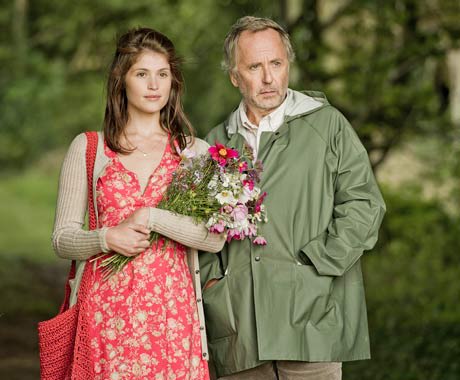Like many of Anne Fontaine's consistently thought-provoking films, Gemma Bovery questions — or at least presents an observation of — traditional ideas of gender. Just as Nathalie shrewdly examined female power dynamics and Adore expanded on the idea that mothers shape their sons as an ideal sexual mate, Gemma Bovery examines the nature of passive objectivity.
The object of desire and scrutiny is the titular Gemma (Gemma Arterton), a seemingly plain and meek Englishwoman transplanted to a rural French village with her husband (Jason Flemyng). Her name, which shares a striking similarity to Flaubert's Madame Bovary, leads Martin Joubert (Fabrice Luchini) — an ex-Parisian living in the country as a baker after suffering professional dissatisfaction — to project the inner dialogue of the fictional character onto her. The perspective here is almost entirely that of Martin, who mutes her inner dialogue, which is already only presented through a series of diary entries read by Martin. At one point, when Martin describes Madame Bovary to Gemma, she remarks, "She sounds pretty wacky." That his, and resultantly our, gaze is distorted is never a secret.
Fontaine frames the film as a breezy dramedy, detailing the obsessive behaviours of Martin as he follows Gemma from place to place, coming up with excuses to find himself in her presence. The metaphors aren't at all subtle — Martin's large, older dog perpetually sniffs at Gemma's significantly smaller puppy — within this intelligently rendered template, allowing the audience to enjoy the cheeky, consistently entertaining dynamic of what might otherwise be a distressing thriller about a stalker.
Fontaine isn't ignorant to this. That we're limited to a male perspective for the duration, a perspective that justifies invasiveness and refuses to acknowledge that his own perceptions and projected character identity of Gemma might be wrong, is quite deliberate. The other women in the periphery of this narrative — Martin's wife (Isabelle Candelier) and Wizzy (Elsa Zylberstein), a nearby acquaintance — demonstrate some awareness of what is going on, and even play coy games of manipulation with each other (Wizzy playfully mocks Gemma's frumpier body type when she notices male attention going her way). Beyond this, the notion of British and French beliefs and etiquettes complicates the gender dynamics, with arguments and discussions about the British tendency to romanticize the French lifestyle and reduce it to glib signifiers like cuisine popping up routinely.
Though we see everyone competing with each other and categorizing everyone using similarly reductionist tactics, the perspective remains staunchly within the lexicon of Martin's consciousness, which ultimately gives Gemma Bovery its whimsical (but quietly biting) tone; it's how he views the world.
On the surface, this fun little character play seems like a playful tale about repressed desires (not unlike Tamara Drewe, in which Arterton similarly played the central object of affection), but underneath there are some clever jabs at gender performance and assumption. It's this carefully balanced interplay between form and content that makes Gemma Bovery succeed where Fontaine's previous, analysis-heavy film Adore struggled.
(Mongrel Media)The object of desire and scrutiny is the titular Gemma (Gemma Arterton), a seemingly plain and meek Englishwoman transplanted to a rural French village with her husband (Jason Flemyng). Her name, which shares a striking similarity to Flaubert's Madame Bovary, leads Martin Joubert (Fabrice Luchini) — an ex-Parisian living in the country as a baker after suffering professional dissatisfaction — to project the inner dialogue of the fictional character onto her. The perspective here is almost entirely that of Martin, who mutes her inner dialogue, which is already only presented through a series of diary entries read by Martin. At one point, when Martin describes Madame Bovary to Gemma, she remarks, "She sounds pretty wacky." That his, and resultantly our, gaze is distorted is never a secret.
Fontaine frames the film as a breezy dramedy, detailing the obsessive behaviours of Martin as he follows Gemma from place to place, coming up with excuses to find himself in her presence. The metaphors aren't at all subtle — Martin's large, older dog perpetually sniffs at Gemma's significantly smaller puppy — within this intelligently rendered template, allowing the audience to enjoy the cheeky, consistently entertaining dynamic of what might otherwise be a distressing thriller about a stalker.
Fontaine isn't ignorant to this. That we're limited to a male perspective for the duration, a perspective that justifies invasiveness and refuses to acknowledge that his own perceptions and projected character identity of Gemma might be wrong, is quite deliberate. The other women in the periphery of this narrative — Martin's wife (Isabelle Candelier) and Wizzy (Elsa Zylberstein), a nearby acquaintance — demonstrate some awareness of what is going on, and even play coy games of manipulation with each other (Wizzy playfully mocks Gemma's frumpier body type when she notices male attention going her way). Beyond this, the notion of British and French beliefs and etiquettes complicates the gender dynamics, with arguments and discussions about the British tendency to romanticize the French lifestyle and reduce it to glib signifiers like cuisine popping up routinely.
Though we see everyone competing with each other and categorizing everyone using similarly reductionist tactics, the perspective remains staunchly within the lexicon of Martin's consciousness, which ultimately gives Gemma Bovery its whimsical (but quietly biting) tone; it's how he views the world.
On the surface, this fun little character play seems like a playful tale about repressed desires (not unlike Tamara Drewe, in which Arterton similarly played the central object of affection), but underneath there are some clever jabs at gender performance and assumption. It's this carefully balanced interplay between form and content that makes Gemma Bovery succeed where Fontaine's previous, analysis-heavy film Adore struggled.
